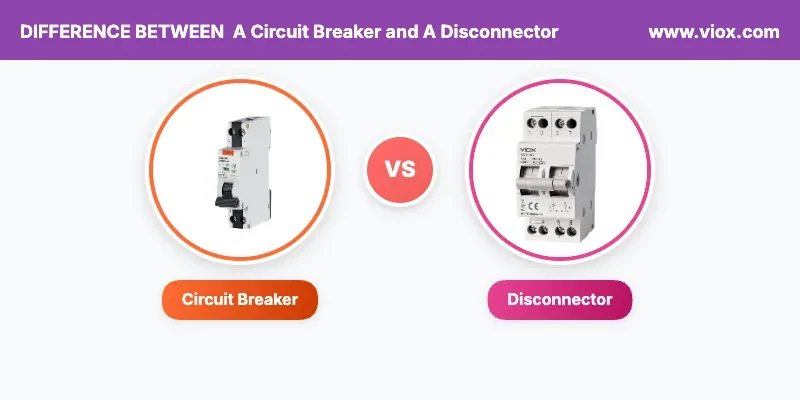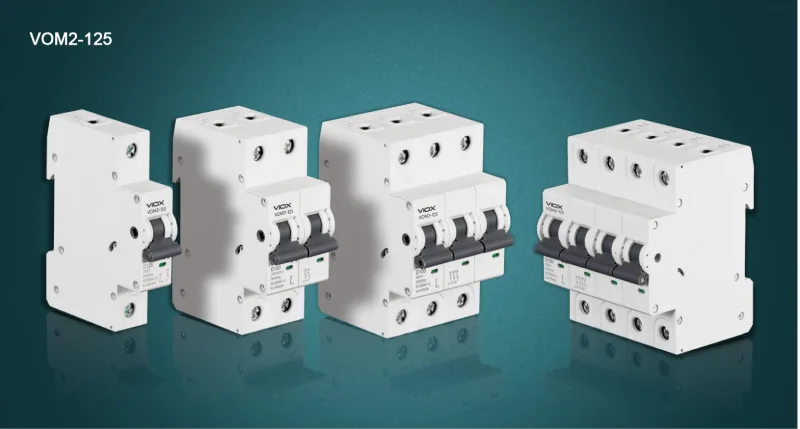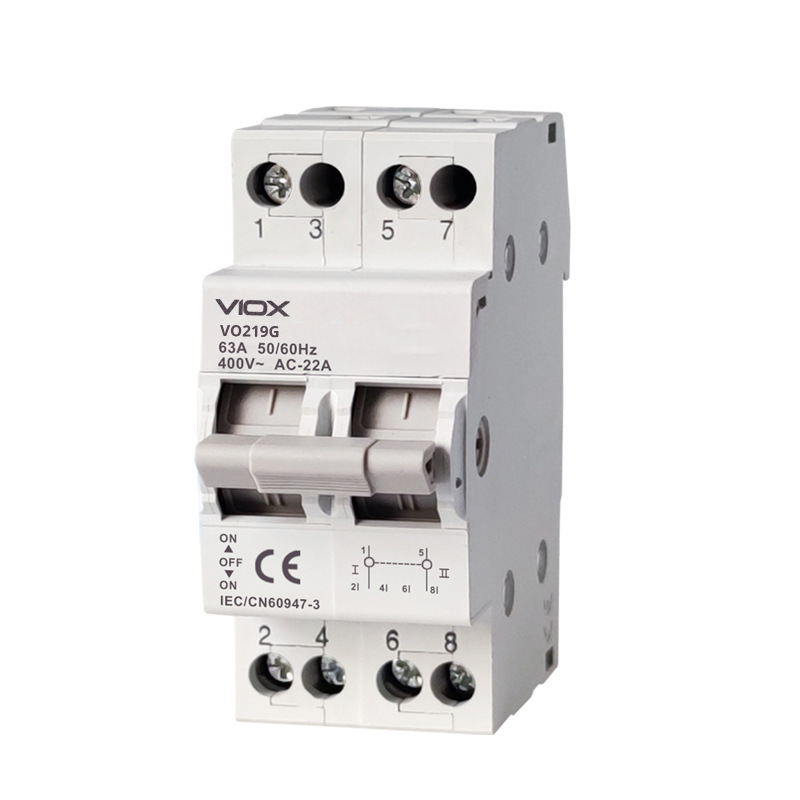Прямой ответ: Автоматический выключатель автоматически прерывает электрический ток при возникновении аварийных ситуаций и может работать под нагрузкой, в то время как разъединитель (изолятор) обеспечивает видимую изоляцию для целей технического обслуживания и должен работать только при обесточенных цепях. Автоматические выключатели обеспечивают защиту; разъединители обеспечивают изоляцию.
Понимание разницы между автоматическими выключателями и разъединителями имеет решающее значение для электробезопасности, надлежащего проектирования системы и соблюдения нормативных требований. Оба устройства управляют электрическими цепями, но служат принципиально разным целям в электрических системах.
Ключевые определения: Автоматические выключатели против разъединителей
Что такое автоматический выключатель?
A автоматический выключатель - это автоматическое электрическое коммутационное устройство, предназначенное для защиты электрических цепей путем прерывания потока тока при возникновении аварийных ситуаций. Он может включать, проводить и отключать токи в нормальных и ненормальных (аварийных) условиях.
Основные характеристики:
- Автоматическая работа при авариях
- Возможность гашения дуги
- Может работать в условиях полной нагрузки
- Обеспечивает защиту от перегрузки по току и короткого замыкания
- Возможность повторного включения после отключения
Что такое разъединитель (изолятор)?
A разъединитель, также называемый изолятором, представляет собой механическое коммутационное устройство, которое обеспечивает изоляцию цепей для целей технического обслуживания и безопасности. Он создает видимый зазор между электрическими контактами в открытом состоянии.
Основные характеристики:
- Только ручное управление
- Видимый изоляционный зазор
- Работает только при обесточенных цепях
- Отсутствие возможности прерывания тока короткого замыкания
- Предотвращает случайное включение во время технического обслуживания
Подробная сравнительная таблица
| Характеристика | Автоматический выключатель | Разъединитель (изолятор) |
|---|---|---|
| Основная цель | Защита от аварий | Изоляция для технического обслуживания |
| Операция | Автоматические и ручные | Только вручную |
| Погашение дуги | Да (SF6, вакуум, масло, воздух) | Нет – минимальная или отсутствует |
| Отключение под нагрузкой | Да – возможность работы при полной нагрузке | Нет – только работа без нагрузки |
| Ток короткого замыкания | Прерывает токи короткого замыкания | Невозможно прервать токи короткого замыкания |
| Видимый зазор | Не требуется | Требуется для безопасности |
| Стандарты | IEC 62271-100, IEEE C37 | IEC 62271-102, IEEE C37.30 |
| Типичное напряжение | Все уровни (НН до СВН) | Среднее и высокое напряжение |
| Стоимость установки | Выше | Нижний |
| Техническое обслуживание | Сложный механизм | Простой механизм |
Объяснение основных различий
1. Возможность прерывания тока короткого замыкания
Автоматические выключатели:
- Предназначены для прерывания токов короткого замыкания до их номинальной мощности
- Используют среды гашения дуги (газ SF6, вакуум, масло или воздух)
- Могут отключать токи, многократно превышающие их номинальный ток, во время аварий
- Необходимы для защиты системы
Разъединители:
- Не могут безопасно прерывать токи короткого замыкания
- Могут создавать опасное искрение при открытии под нагрузкой
- Используются только после того, как цепь обесточена другими средствами
- В первую очередь изоляция, а не прерывание
2. Условия эксплуатации
Автоматические выключатели:
- Работают в нормальных и аварийных условиях
- Могут включать и отключать токи полной нагрузки
- Функционируют автоматически при ненормальных условиях
- Подходят для частой эксплуатации
Разъединители:
- Работают только в условиях отсутствия нагрузки или минимальной нагрузки
- Требуют обесточивания цепи перед началом работы
- Ручное управление с видимой индикацией положения
- Нерегулярная эксплуатация для целей технического обслуживания
⚠️ Предупреждение о безопасности: Никогда не работайте с разъединителем под нагрузкой. Это может привести к опасному искрению, повреждению оборудования и серьезным угрозам безопасности.
Приложения и примеры использования
Когда использовать автоматические выключатели
Промышленное применение:
- Защита и управление двигателем
- Защита фидеров в распределительных системах
- Защита генераторов и трансформаторов
- Прерывание тока короткого замыкания в энергосистемах
Коммерческое применение:
- Защита главного сервисного разъединителя
- Защита ответвлений цепи
- Применение в центрах нагрузки
- Интеграция автоматического переключателя
Применение в жилых помещениях:
- Защита основной электрической панели
- Индивидуальная защита цепи
- Защита GFCI и AFCI
- Интеграция защиты от перенапряжения для всего дома
Когда использовать разъединители
Применение на подстанциях:
- Секционирование шин
- Изоляция оборудования для технического обслуживания
- Требования к видимой изоляции
- Коммутация линий в системах передачи
Промышленное применение:
- Выключатели-разъединители для двигателей
- Изоляция оборудования
- Безопасная изоляция для технического обслуживания
- Точки аварийного отключения
Применение при техническом обслуживании:
- Создание безопасных рабочих зон
- Процедуры блокировки/маркировки
- Изоляция оборудования для обслуживания
- Визуальное подтверждение обесточивания
Критерии выбора и рекомендации экспертов
Выбор автоматических выключателей
Ключевые факторы, которые следует учитывать:
- Номинальный ток: Должен превышать нормальный рабочий ток
- Отключающая способность: Должна превышать максимальный ток короткого замыкания
- Номинальное напряжение: Должно соответствовать или превышать напряжение системы
- Тип нагрузки: Учет характеристик двигателя, резистивной и емкостной нагрузки
- Условия окружающей среды: В помещении/на открытом воздухе, температура, загрязнение
Совет эксперта: Всегда обращайтесь к результатам расчетов токов короткого замыкания при выборе автоматических выключателей. Отключающая способность должна превышать максимальный доступный ток короткого замыкания в точке установки.
Выбор разъединителей
Ключевые факторы, которые следует учитывать:
- Требования к изоляции: Спецификации видимого разрыва
- Механическая износостойкость: Ожидаемое количество циклов срабатывания
- Степень защиты от воздействия окружающей среды: Устойчивость к погодным условиям для наружных устройств
- Требования к блокировкам: Защитные блокировки с другим оборудованием
- Доступность: Простота эксплуатации и доступа для технического обслуживания
Совет эксперта: Указывайте разъединители с вспомогательными контактами для удаленной индикации положения. Это повышает безопасность и осведомленность об операциях.
Безопасность и соответствие нормам
Требования Национального электротехнического кодекса (NEC)
Статья 240 – Защита от перегрузки по току:
- Автоматические выключатели должны обеспечивать защиту от перегрузки по току
- Правильная координация с вышестоящими защитными устройствами
- Требования к защите от дугового пробоя и замыкания на землю
Статья 430 – Двигатели:
- Защита от короткого замыкания отходящей цепи двигателя
- Требования к разъединителю двигателя в пределах видимости
- Спецификации комбинированных пускателей двигателей
Соответствие стандартам IEEE
Стандарты серии IEEE C37:
- C37.04: Стандарт для структуры номинальных параметров автоматических выключателей
- C37.06: Стандарты на автоматические выключатели переменного тока высокого напряжения
- C37.30: Стандарты на разъединители
Ключевые моменты соответствия:
- Правильное применение в пределах номинальных параметров
- Испытания на соответствие требованиям окружающей среды
- Сейсмическая квалификация, если требуется
- Требования к электромагнитной совместимости
⚠️ Рекомендация профессионала: Всегда консультируйтесь с лицензированными инженерами-электриками для применений среднего и высокого напряжения. Неправильный выбор может привести к катастрофическим отказам.
Установка и обслуживание
Рекомендации по установке автоматических выключателей
Пошаговый процесс установки:
- Планирование перед установкой
- Убедитесь, что электрические параметры соответствуют применению
- Подтвердите доступные уровни тока короткого замыкания
- Проверьте условия окружающей среды
- Физическая установка
- Соблюдайте моменты затяжки, указанные производителем
- Обеспечьте надлежащее подключение проводников
- Проверьте механические зазоры
- Тестирование и ввод в эксплуатацию
- Первичная проверка релейной защиты
- Испытание механической эксплуатации
- Проверка времени срабатывания и сопротивления контактов
Рекомендации по установке разъединителей
Пошаговый процесс установки:
- Подготовка площадки
- Проверьте требования к фундаменту
- Проверьте зазор до токоведущих частей
- Обеспечьте доступность для работы
- Механическая установка
- Следуйте процедурам выравнивания, указанным производителем
- Проверьте функцию рабочего механизма
- Проверьте системы блокировки
- Электрическое подключение
- Используйте правильные методы подключения проводников
- Приложите указанное контактное давление
- Проверьте соединения вспомогательных цепей
Поиск и устранение неисправностей
Проблемы с автоматическими выключателями
Симптом: Автоматический выключатель не включается
- Проверьте источник питания цепи управления
- Проверьте механизм пружинного взвода
- Осмотрите механические блокировки
- Проверьте целостность обмотки включения
Симптом: Ложные срабатывания
- Проанализируйте профили тока нагрузки
- Проверьте, нет ли ослабленных соединений
- Проверьте правильность координации время-токовых характеристик
- Учитывайте экологические факторы
Проблемы с разъединителем
Симптом: Затрудненное оперирование
- Осмотрите смазку механизма оперирования
- Проверьте наличие механических заеданий
- Проверьте правильность регулировки
- Осмотрите износ контактов
Симптом: Плохая работа контактов
- Проверьте настройки контактного давления
- Осмотрите на предмет загрязнения
- Проверьте правильность выравнивания
- Рассмотрите совместимость материала контактов
Краткое справочное руководство
Краткие сведения об автоматических выключателях
- Основная функция: Автоматическая защита от повреждений
- Может работать: Под нагрузкой и в условиях повреждения
- Погашение дуги: Да – доступны различные технологии
- Типичные области применения: Защита и переключение
- Ссылки на код: Статья 240 NEC, серия IEEE C37
Краткие сведения о разъединителях
- Основная функция: Изоляция для технического обслуживания
- Может работать: Только при обесточенном состоянии
- Погашение дуги: Нет – полагается на воздушный промежуток
- Типичные области применения: Изоляция и видимый разрыв цепи
- Ссылки на код: Статья 430.102 NEC, IEEE C37.30
Вопросы и ответы
Может ли разъединитель заменить автоматический выключатель?
Нет, разъединитель не может заменить автоматический выключатель. Разъединителям не хватает возможности прерывания тока короткого замыкания, и они не могут обеспечить защиту от перегрузки по току, требуемую электрическими нормами.
Когда следует использовать оба устройства вместе?
Оба устройства обычно используются вместе в приложениях среднего и высокого напряжения, где для безопасной эксплуатации и технического обслуживания требуются функции защиты (автоматический выключатель) и изоляции (разъединитель).
Что произойдет, если оперировать разъединителем под нагрузкой?
Оперирование разъединителем под нагрузкой может вызвать опасное образование дуги, повреждение оборудования, опасность пожара и потенциальные травмы. Эта практика нарушает правила техники безопасности и рекомендации производителя.
Имеются ли в наличии комбинированные устройства?
Да, некоторые производители предлагают комбинированные устройства автоматический выключатель-разъединитель, особенно для двигателей. Эти устройства обеспечивают как защиту, так и видимую изоляцию в одном блоке.
Как определить правильную последовательность операций?
Для систем с обоими устройствами всегда сначала оперируйте автоматическим выключателем, чтобы прервать ток, а затем оперируйте разъединителем для изоляции. При повторном включении питания поменяйте эту последовательность на обратную.
Каковы типичные интервалы технического обслуживания?
Автоматические выключатели обычно требуют технического обслуживания каждые 5-10 лет в зависимости от применения и рекомендаций производителя. Разъединители могут требовать технического обслуживания каждые 10-15 лет из-за их более простых механизмов.
Могут ли разъединители быть автоматизированы?
Да, разъединители могут быть оснащены моторными приводами для дистанционного управления, но они по-прежнему должны работать только в условиях отсутствия нагрузки и обычно требуют дополнительных предохранительных блокировок.
Каковы различные типы технологий автоматических выключателей?
Основные типы включают воздушные автоматические выключатели (ACB), вакуумные автоматические выключатели (VCB), элегазовые автоматические выключатели (SF6) и масляные автоматические выключатели, каждый из которых подходит для различных уровней напряжения и применений.
Профессиональная рекомендация: Для любой электрической установки или модификации, включающей автоматические выключатели или разъединители, проконсультируйтесь с лицензированным инженером-электриком или сертифицированным электриком. Правильное применение этих устройств имеет решающее значение для безопасности, соответствия нормам и надежной работы.
Помнить: Автоматические выключатели защищают вашу электрическую систему от повреждений, а разъединители защищают вас во время технического обслуживания. Оба являются важными компонентами безопасной конструкции электрооборудования, но они служат совершенно разным целям, и их никогда не следует путать или неправильно применять.




